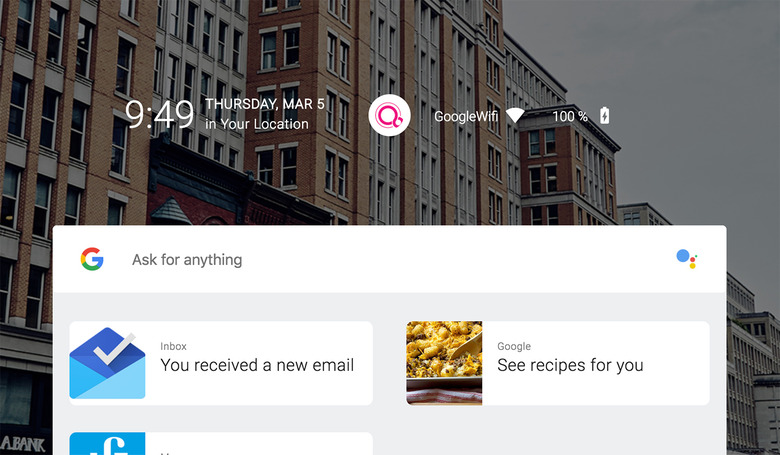Google Is Finally Ready To Talk Openly About The Mysterious New OS That Might Replace Android
We've been talking for a few years about Google's mysterious operating system meant to replace Android, Chrome, and whatever Android-derived operating systems Google has running on its smart devices. We've seen the first demos leak, we read reports about is development, and we saw Google start deploying the software development kit that will allow developers to code universal apps that will run on Android, iOS, computer operating system, and — of course — Fuchsia.
Fuchsia is what we've been told we should call this mysterious operating system that will not only run on everything made by Google, but it'll also fix some of the worst things about Android, including fragmentation, update speed, and privacy. But Google is finally talking about Fuchsia, the Android slayer that was promised — and they call it Fuchsia too.
We're still years away from seeing Google launching the first Fuchsia devices, but it's still refreshing to see Google mention it. That's because it means Fuchsia is a real thing, and the project is getting more weight at Google. Some of the previous reports about the operating system cautioned that Fuchsia development caused some concerns inside the company, prompting some to wonder whether Fuchsia will ever see the light of day.
Google's Hiroshi Lockheimer, who leads the company's Android and Chrome efforts, opened up about Fuchsia at I/O 2019 this week.
"We're looking at what a new take on an operating system could be like. And so I know out there people are getting pretty excited saying, 'Oh this is the new Android,' or, 'This is the new Chrome OS,'" he said, per The Verge Fuchsia is really not about that. Fuchsia is about just pushing the state of the art in terms of operating systems and things that we learn from Fuchsia we can incorporate into other products."
The exec said the point of the experimental OS is to use on all sorts of devices and form factors, which makes plenty of sense considering that Google is also very interested in the smart home aspect of your life. "You know Android works really well on phones, and you know in the context of Chrome OS as a runtime for apps there. But Fuchsia may be optimized for certain other form factors as well. So we're experimenting," he said. "Think about dedicated devices... right now, everybody assumes Fuchsia is for phones. But what if it could be used for other things?"
But it would make even more sense for Fuchsia to be the unified operating system that would power all mobile devices, regardless of form factors.
Fuchsia also made a notable appearance in a Medium post about Flutter penned by Google's Kevin Moore. Flutter is that app development kit we mentioned before, and Google announced a new update for it for browsers:
Since its first beta last year, customers have been using Flutter to create mobile apps that run on iOS and Android. However, Flutter was always architected as a portable UI toolkit and, among other places, runs on Windows, Mac, Fuchsia, and even Raspberry Pi. Since Flutter is built using Dart, which includes production-quality compilers for both native machine code and JavaScript, we had a solid foundation. The remaining challenge was to replace the Skia-based graphics engine and text renderer with web-platform equivalents.
But wait, it gets even better. During the regular I/O Fireside Chat, developers asked Google execs directly about Fuchsia, 9to5Google reports. Here's what Dave Burke, Google's vice president of engineering for Android had to say when a developer asked if there's anything Google can share about Fuchsia:
There's some good collaboration happening between the teams. To give you two examples is one is we have this ANGLE driver on Q and the idea is that we have a module—it's a mainline module—and it implements OpenGL ES 2.0, just finishing that off, and soon 3.0 and it runs on top of Vulkan, and we actually developed that with Fuchsia because Fuchsia uses Vulkan at the base level for graphics, like Android is migrating to. So we worked closely there.
Also on Jetpack Compose, which is our new UI toolkit, we worked very closely with the Flutter team. One of the things that we care about is having–I care about, in particular, is having transferable skills. So if you know Flutter the toolkit on Android should look familiar too so you can move between them, and that's something we've done a collaboration on.
Our viewpoint with Fuchsia is more about the things we're doing with them, but I cannot really speak to exactly their projects as I'll get them all wrong.
The main takeaway here seems to be that Google has dedicated Fuchsia and Flutter teams that work alongside the Android team on some features.
That said, it'll probably be years until Google launches the first Fuchsia devices. But at least Google is finally acknowledging and sharing more details about the operating system.
